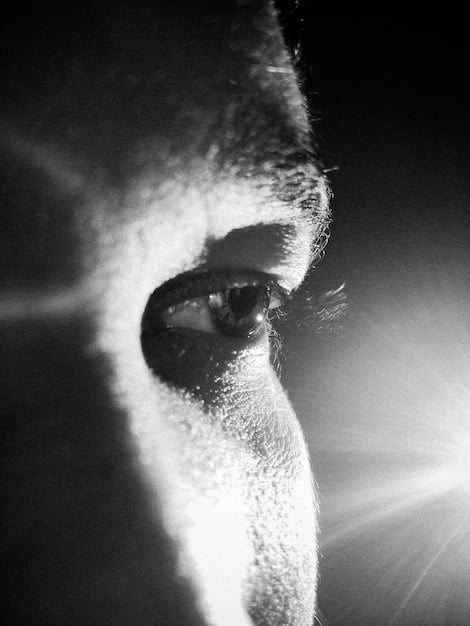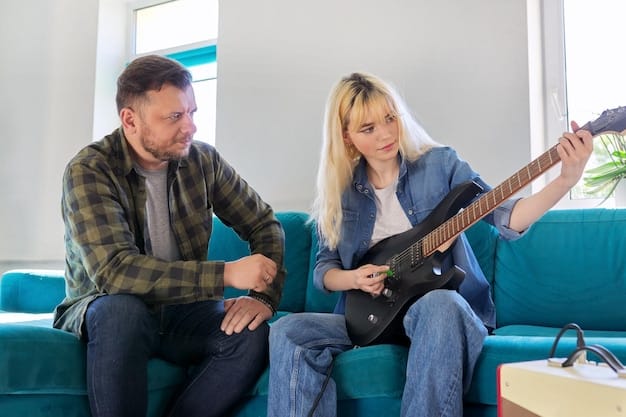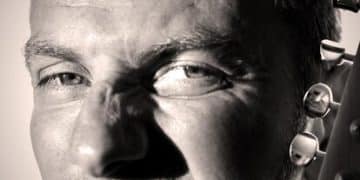The Power of Vulnerability: Rock Stars Open Up in New Interviews

The Power of Vulnerability: Rock Stars Share Their Struggles in Recent Interviews reveals the profound impact of artists openly discussing their mental health, addiction, and personal challenges, fostering connection and inspiring audiences worldwide.
In an era where authenticity is highly valued, the power of vulnerability: rock stars share their struggles in recent interviews has become increasingly apparent. Musicians who were once perceived as untouchable icons are now opening up about their personal battles, offering a glimpse into the human experience behind the fame and fortune.
Why Vulnerability Resonates with Fans
The shift towards vulnerability in the music industry reflects a broader cultural change. Fans are no longer satisfied with superficial portrayals of success; they crave authenticity and connection with the artists they admire. When rock stars share their struggles, they bridge the gap between celebrity and everyday life, creating a sense of empathy and understanding.
Breaking Down Barriers
Historically, the image of a rock star was often one of invincibility, rebellion, and excess. However, this idealized persona can be isolating for both the artist and the audience. By being vulnerable, musicians challenge these stereotypes and create a more inclusive and relatable narrative.
Fostering Empathy and Connection
When artists openly discuss their challenges with mental health, addiction, or personal loss, it normalizes these experiences and encourages fans to do the same. This can lead to stronger connections between artists and their audience, built on shared experiences and mutual understanding.
- Mental health struggles are destigmatized.
- Fans feel less alone in their own battles.
- Artists become more relatable and approachable.
- A community of support and understanding is fostered.

Furthermore, the power of vulnerability: rock stars share their struggles in recent interviews extends beyond individual connections. These open conversations can spark broader societal discussions about mental health, addiction, and the pressures of fame. By using their platform to advocate for these issues, rock stars can make a significant impact on public awareness and policy.
Vulnerability resonates because it’s real. It strips away the artifice and reveals the human being beneath the rock star persona. This authenticity fosters a deeper connection with fans who appreciate the honesty and courage required to share such personal struggles.
Mental Health Advocacy in Rock Music
Rock stars speaking out about mental health isn’t just a trend; it’s a crucial act of advocacy. By sharing their experiences, they’re helping to destigmatize mental illness and encouraging others to seek help.
The Impact of Open Conversations
When influential figures like rock stars openly address their mental health challenges, they help to normalize the conversation and reduce the stigma associated with seeking help. This can be particularly impactful for young fans who may be struggling with similar issues.
Resources and Support Systems
Many rock stars are using their platforms to raise awareness about mental health resources and support systems. They are partnering with organizations that provide counseling, therapy, and other forms of assistance to those in need.
The power of vulnerability: rock stars share their struggles in recent interviews can inspire fans to seek help and connect with support networks.
- Promoting mental health awareness through social media.
- Partnering with mental health organizations and charities..
- Sharing stories of recovery and resilience.
- Encouraging fans to prioritize their mental well-being.
Beyond individual stories, some artists are actively involved in fundraising and advocacy for mental health initiatives. This includes organizing benefit concerts, donating proceeds from merchandise sales, and participating in public awareness campaigns.
Ultimately, mental health advocacy in rock music is about creating a culture of openness, acceptance, and support. By sharing their own vulnerabilities, rock stars are empowering fans to prioritize their mental well-being and seek the help they need.
Navigating Addiction and Recovery in the Spotlight
Addiction is a pervasive issue that affects people from all walks of life, including rock stars. The pressures of fame, coupled with the demands of touring and performing, can create a perfect storm for substance abuse. However, many musicians are now openly discussing their struggles with addiction and recovery, offering hope and inspiration to others.
The Realities of Addiction in the Music Industry
The music industry often glamorizes substance abuse, perpetuating a culture of excess and recklessness. However, the reality of addiction is far from glamorous. It can lead to physical and mental health problems, strained relationships, and even death. Addiction is a disease that doesn’t discriminate, and the power of vulnerability: rock stars share their struggles in recent interviews illustrates this.
The Road to Recovery
Recovery from addiction is a challenging and often lifelong process. It requires courage, commitment, and a strong support system. Many rock stars have spoken openly about their experiences in recovery, sharing the ups and downs of their journey and offering encouragement to others.
- Seeking professional help and therapy.
- Building a strong support system of friends and family.
- Finding healthy coping mechanisms, such as exercise or meditation.
- Staying committed to sobriety, one day at a time.

The power of vulnerability: rock stars share their struggles in recent interviews can challenge the glamorized image of addiction. These honest accounts can help to break down the stigma surrounding substance abuse and encourage others to seek help.
Addiction is a complex issue with no easy solutions, but by sharing their stories, rock stars are helping to raise awareness, inspire hope, and promote recovery.
The Impact on Future Generations of Musicians
The increasing openness of rock stars about their personal struggles is having a profound impact on future generations of musicians. Aspiring artists are now growing up in a landscape where vulnerability is not only accepted but also celebrated.
Creating a Healthier Industry Culture
By challenging the traditional image of the invincible rock star, contemporary artists are helping to create a healthier and more supportive industry culture. This can lead to less pressure to conform to unhealthy behaviors and more emphasis on mental and physical well-being.
Empowering New Artists to Share Their Stories
When established musicians openly share their struggles, it empowers new artists to do the same. This can lead to a more authentic and relatable music scene, where artists are free to express themselves without fear of judgment or reprisal.
The power of vulnerability: rock stars share their struggles in recent interviews can lead to a generation of musicians that are more grounded, authentic, and connected to their audience.
- Promoting self-care and mental wellness.
- Encouraging open communication and support.
- Challenging unrealistic expectations and pressures.
- Fostering a sense of community and shared experience.
Ultimately, the impact on future generations will be determined by the continued commitment to vulnerability and authenticity within the music industry. By embracing these values, rock stars can help to create a more supportive and fulfilling environment for all artists.
In essence, vulnerability normalizes imperfection and builds resilience.
The Role of Social Media in Sharing Vulnerability
Social media has revolutionized the way rock stars connect with their fans, providing a direct and unfiltered platform for sharing their thoughts, feelings, and experiences. This has created new opportunities for vulnerability, allowing artists to connect with their audience on a more personal level.
Unfiltered Access to Artists’ Lives
Social media allows fans to get a glimpse into the everyday lives of their favorite rock stars. This can include behind-the-scenes photos, live videos, and personal updates. This unfiltered access can create a sense of intimacy and connection, making artists feel more relatable and approachable.
Creating Online Communities of Support
Social media can also be used to create online communities of support, where fans can connect with each other and share their own experiences. These communities can provide a sense of belonging and validation, particularly for those who may be struggling with mental health issues or addiction.
The power of vulnerability: rock stars share their struggles in recent interviews can lead to a more authentic and supportive online environment, where fans feel comfortable sharing their own stories and seeking help when needed.
- Sharing personal struggles and challenges.
- Promoting mental health awareness and resources.
- Engaging in open and honest conversations.
- Creating a safe and supportive online community.
However, it’s important to acknowledge the potential downsides of social media, particularly the risk of online harassment and negativity. Artists who choose to be vulnerable on social media must be prepared to deal with these challenges and take steps to protect their mental well-being.
Ultimately, used thoughtfully, social media can be a powerful tool for sharing vulnerability and fostering connection between rock stars and their fans.
Criticisms and Considerations of Oversharing
While vulnerability is generally viewed as a positive trait, there are also criticisms and considerations to be made about oversharing. Some argue that constantly sharing personal struggles can be attention-seeking or even exploitative. It’s important for artists to consider the potential impact of their words and actions, both on themselves and on their audience.
The Fine Line Between Authenticity and Attention-Seeking
It can be difficult to discern the line between genuine authenticity and attention-seeking behavior. Some critics argue that artists who constantly share their struggles may be doing so for personal gain, rather than out of a genuine desire to connect with their audience. It’s important for artists to be mindful of their motivations and to ensure that their vulnerability is coming from a place of sincerity.
The Potential for Exploitation and Misinterpretation
Vulnerability can also be exploited or misinterpreted. Artists who share their struggles may be vulnerable to online harassment, criticism, or even doxxing. It’s important for artists to protect themselves and to be mindful of the potential risks of sharing personal information online.
The power of vulnerability: rock stars share their struggles in recent interviews is not without its potential pitfalls. It’s important for artists to be thoughtful and intentional in their approach to vulnerability, to ensure that they are not causing harm to themselves or to their audience.
It’s critical to respect boundaries and seek professional guidance when necessary.
- Setting boundaries and protecting personal privacy.
- Seeking professional guidance and support.
- Being mindful of the potential impact on others.
- Prioritizing self-care and mental well-being.
Ultimately, the decision of whether or not to be vulnerable is a personal one. There is no right or wrong answer, and each artist must weigh the potential benefits and risks before deciding to share their struggles with the world.
| Key Point | Brief Description |
|---|---|
| ❤️ Vulnerability Impact | Authenticity resonates by bridging the gap between artists and fans. |
| 💪 Mental Health Advocacy | Stars destigmatize mental illness by sharing struggles. |
| 🌟 Future Generations | Openness creates a healthier industry culture for aspiring artists. |
| 📱 Social Media | Direct channel offers a platform to engage with fans more closely. |
Frequently Asked Questions
▼
Vulnerability helps rock stars connect with their audience on a deeper level, making them more relatable and humanizing their image. It fosters authenticity, empathy, and a sense of community among fans.
▼
Rock stars use their platforms by speaking openly about personal mental health struggles, partnering with organizations, raising awareness through social media campaigns, and sharing stories of recovery and resilience.
▼
Musicians in the spotlight face challenges such as the pressures of fame, constant touring, easy access to substances, and a culture that often glamorizes substance abuse, making recovery more difficult.
▼
Social media provides a direct platform for rock stars to share unfiltered thoughts and experiences, fostering personal connections with fans. It also creates online communities of support but carries risks of harassment.
▼
Criticisms of oversharing include concerns about attention-seeking behavior, the potential for exploitation, and the misinterpretation of vulnerability, requiring artists to balance authenticity with personal boundaries.
Conclusion
In conclusion, the rise of vulnerability among rock stars represents a significant shift in the music industry, fostering deeper connections with fans, promoting mental health awareness, and inspiring future generations of artists to embrace authenticity. The impact of this trend is far-reaching, transforming the way rock stars engage with their audience and contributing to a more supportive and understanding cultural landscape.





